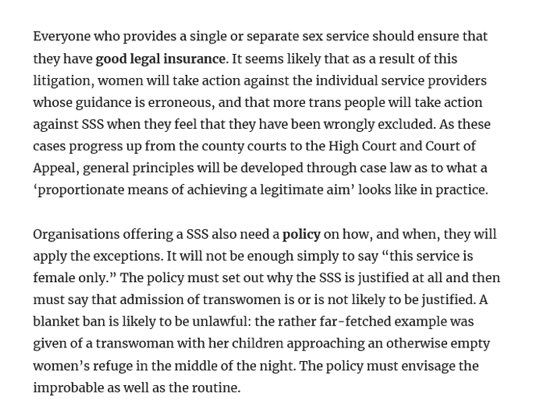
Thread by @setoacnna 👇 explaining important U.K. judgement, which rejected long-standing “gender critical” legal arguments as hopeless.
Adding a few comments of mine 1/
Adding a few comments of mine 1/
https://twitter.com/setoacnna/status/1431213643455246345
‘Legal feminist’ a group / website led by the junior barrister who represented the unsuccessful claimant hopes there’ll be much more litigation by anti-trans people and trans victims of discrimination 2/ 

I can see why lawyers hope for litigation. AEA took in around £100K from their supporters for legal fees. (The court was told the junior barrister acted for free in this case - so that went to solicitors and the QC) 2/ 

But when a case fails as badly as this one, that doesn’t suggest there will be more. Why should businesses risk litigation by changing their practices, when the court has *upheld* EHRC’s long-standing guidance? 3/
And having lost here, why would anti-trans campaigners think litigating the same kinds of issues is the right way forwards? Wouldn’t it make more sense to campaign to change the law? 4/
But their strategic litigation strategy does make sense - if you don’t see the objective as winning at court. 5/
Taking hard cases which lose can be strategic. It publicises the issue and can bring home how the law is wrong.
Litigation can run alongside campaigning for law reform. 6/
Litigation can run alongside campaigning for law reform. 6/
Maybe that’s the GC strategy here. Take cases to show the injustice / unworkability of existing equality laws.
But this may be a real struggle. Because those cases require actual individuals who claim to have suffered harm - not just rhetorical/theoretical tweets. 7/
But this may be a real struggle. Because those cases require actual individuals who claim to have suffered harm - not just rhetorical/theoretical tweets. 7/
Losing cases is also very expensive. That’s why you rarely see campaigning NGOs and charities lose legal cases. They’re reluctant to go to court unless their prospects are good.
But that doesn’t seem to be a concern for GC campaigners. 8/
But that doesn’t seem to be a concern for GC campaigners. 8/
Maybe fund-raising for litigation is a movement-building activity. The case may be hopeless and all the money will go to lawyers, but supporters who give money feel invested in the case, it’s a kind of activism. 9/
Being on the receiving end of litigation is also expensive. Even if the court orders the campaigners to pay the legal costs, the business / body on the receiving end will always have unmet costs of staff time. And possibly reputation. 10/
Threats of litigation - however hopeless - can create a hostile environment, subtly influencing decision-makers to avoid trouble. 11/
But if the real aims are not to win in court, but only to build solidarity and wear down / pressure business and statutory bodies, that’s not a public position GC campaigners admit to. Their fund raising depends on promise of success. 👇
https://twitter.com/truesolicitor/status/1431295715934937089
There may be parallels with the long-standing Christian Legal Centre’s approach to litigation, which seems more about going to court because it’s morally correct / the only way to raise publicity 13/
https://twitter.com/danbeale1/status/1431294364848885760
Indeed, UK GC campaigners have talked openly about how far-right Christian funding could come to them for court cases. Though it’s unclear how much - if any - of this money has been used to fund their cases. 14/
With other campaigns, institution-building (offices, staff, membership lists) is usually done long before litigation. Which may make for a more cautious litigation strategy.
Afaik GCs don’t have democratic structures or collective responsibility. AEA is a one woman CIC 15/
Afaik GCs don’t have democratic structures or collective responsibility. AEA is a one woman CIC 15/
So the promise of more law cases may never be realised. Supporters may start to doubt promises of legal victory by people like Anne Sinnott who explain AEA’s failure as “the judge didn’t understand our brilliant argument” (er, why didn’t you appeal then?) 16/ 

As for the claim that the AEA judgment didn’t set a legal precedent - the judgment *is* legally citeable in other cases. And if others try the same daft arguments, they may have to pay the legal costs of doing so. 17/
But more likely IMO is that we will eventually see other cases, even if only from manufactured situations, like those where GC campaigners confront publicans or trans folk having a quiet pint. 18/
Why would there be more cases? Because GC campaigners have shown real ability in funding litigation (even hopeless cases), and they will play to that strength 19/19
• • •
Missing some Tweet in this thread? You can try to
force a refresh





